#AWS Cloud migration services
Explore tagged Tumblr posts
Text
Unlocking Business Potential with AWS Cloud Migration Services

AWS Cloud Migration Services | Goognu
in today’s fast-paced digital world, businesses face relentless competition and rapidly changing market dynamics. To stay ahead, organizations must be innovative, efficient, and adaptive. Enter AWS Cloud Migration Services — the ultimate solution for businesses aiming to scale, optimize costs, and leverage cutting-edge technology for sustainable growth.
Amazon Web Services (AWS) has established itself as a trusted leader in cloud computing, offering a comprehensive suite of tools and services. From computing power to storage solutions, AWS facilitates a seamless transition to the cloud, ensuring businesses can operate with flexibility and efficiency. With a robust infrastructure, businesses gain access to advanced cloud-based services, such as machine learning, data analytics, and scalable storage. These capabilities make AWS Cloud Migration Services a cornerstone for businesses seeking operational excellence and digital transformation.
Understanding AWS Cloud Migration Services
AWS Cloud Migration Services empower businesses to migrate their data, applications, and workloads to the cloud. This transition is not merely a technological upgrade but a strategic move to unlock growth and innovation. By adopting AWS, organizations can harness the flexibility to scale resources up or down based on demand, ensuring cost efficiency and optimal performance.
One of the key advantages of AWS is its ability to support serverless architectures. By moving away from traditional server-based models, businesses can streamline operations and enhance scalability. AWS’s serverless computing solutions enable organizations to focus on innovation without worrying about infrastructure management.
AWS migration services adopt a holistic approach, starting with a detailed analysis of existing frameworks and workloads. This enables businesses to identify pain points and create a tailored roadmap for a smooth migration. With AWS’s expertise, tools, and resources, organizations can navigate the complexities of cloud migration with confidence, unlocking reliable opportunities for success.
Why Businesses Need AWS Cloud Migration Services
In a world driven by digitalization, businesses are increasingly turning to cloud computing to maintain a competitive edge. Here are some compelling reasons to embrace AWS Cloud Migration Services:
1. Scalability and Flexibility
AWS provides unparalleled scalability, allowing businesses to adjust resources based on demand. Whether scaling up during peak seasons or scaling down during quieter periods, AWS ensures seamless operations. This elasticity helps organizations respond swiftly to changing market conditions.
2. Cost Efficiency
One of the most significant benefits of AWS is its pay-as-you-go model. Businesses only pay for the resources they use, leading to substantial cost savings. This approach enables organizations to optimize their IT spending and reduce operational costs without compromising performance.
3. Enhanced Security
AWS prioritizes security, offering robust measures to protect data, applications, and workloads. By migrating to AWS, businesses can take advantage of advanced security features, ensuring the safety and integrity of their data.
4. Innovation and Growth
AWS’s cloud migration services facilitate the adoption of innovative technologies, such as machine learning and data analytics. These tools empower businesses to gain valuable insights, improve decision-making, and drive growth.
5. Expert Guidance
AWS migration experts play a crucial role in guiding businesses through complex challenges. From assessing IT infrastructure to creating customized migration strategies, these experts ensure a smooth transition to the cloud.
The Role of Goognu in AWS Cloud Migration Services
When it comes to leveraging AWS Cloud Migration Services, Goognu stands out as a trusted partner. With over 13 years of industry experience, Goognu specializes in tailoring AWS solutions to meet the unique needs of businesses. Here’s how Goognu elevates the cloud migration experience:
1. Comprehensive Assessments
Goognu begins with a thorough analysis of an organization’s IT infrastructure. This assessment identifies existing challenges and opportunities, paving the way for a well-defined migration roadmap.
2. End-to-End Support
From initial planning to implementation and ongoing management, Goognu offers end-to-end support. Whether migrating legacy applications or modernizing cloud architecture, Goognu ensures a seamless journey.
3. Customized Solutions
Understanding that every business is unique, Goognu delivers tailored solutions. These include data migration services, infrastructure modernization, and enhanced optimization strategies to drive efficiency and growth.
4. 24/7 Assistance
Goognu’s round-the-clock support ensures businesses are never alone. With reliable assistance available at all times, organizations can address concerns and maintain uninterrupted operations.
Key Features of AWS Cloud Migration Services by Goognu
1. Uplifted Innovation
AWS supports a range of business practices that drive expansion and improvement. By fostering innovation, AWS enables organizations to stay ahead of the curve.
2. Worldwide Recognition and Reach
AWS’s global infrastructure allows businesses to reach a broader audience. This worldwide reach maximizes investments and opens new growth opportunities.
3. Operational Efficiency
AWS simplifies operational tasks, reducing administrative burdens. By enabling seamless interactions, businesses can focus on strategic priorities.
4. Data Analytics and Insights
With AWS’s advanced analytics tools, organizations can gain actionable insights from their data. These insights support informed decision-making and drive better business outcomes.
Benefits of AWS Cloud Migration Services
Improved Performance
AWS ensures high performance through its robust infrastructure and scalable resources. Businesses can achieve consistent performance even during peak demand periods.
Reduced Downtime
AWS’s reliable migration process minimizes downtime, ensuring a smooth transition with minimal disruption to operations.
Greater Agility
By leveraging AWS, businesses can quickly adapt to changing market dynamics and seize new opportunities. This agility is crucial for staying competitive in today’s fast-paced environment.
Enhanced Collaboration
AWS’s cloud-based solutions enable teams to collaborate more effectively, fostering innovation and improving productivity.
Why Choose Goognu for AWS Cloud Migration Services?
1. Proven Expertise
With over 13 years of experience, Goognu brings unmatched expertise in AWS consulting. Their seasoned professionals understand the intricacies of cloud migration, ensuring successful outcomes.
2. Focus on Security
Goognu prioritizes data security, offering solutions that safeguard sensitive information and maintain compliance with industry standards.
3. Cost-Effective Solutions
By optimizing IT spending, Goognu helps businesses reduce costs while maximizing the value of their cloud investments.
4. Reliable Support
Goognu’s 24/7 support ensures businesses always have access to assistance, helping them navigate challenges and achieve their goals.
Conclusion
In an era where digital transformation is imperative, AWS Cloud Migration Services offer businesses the tools and resources they need to thrive. By partnering with Goognu, organizations can harness the full potential of AWS, driving innovation, growth, and efficiency. Whether it’s optimizing costs, improving security, or embracing advanced technologies, AWS and Goognu together pave the way for a successful cloud journey.
Ready to embark on your cloud migration journey? Connect with Goognu today and unlock the true potential of your business with AWS Cloud Migration Services.
0 notes
Text
The impact of Amazon Bedrock on the future of business

As business technology evolves, Amazon Bedrock is reshaping the way organizations operate. In the future, artificial intelligence could transform not only businesses but entire industries. Embark on a journey exploring how Amazon Bedrock redefines strategies and innovations based on generative AI, where advanced AI tools redefine strategies.
What is Amazon Bedrock and why is it important?
Amazon Bedrock, a new offering from Amazon Web Services (AWS), is a crucial player in the generative AI arena. It provides businesses with advanced tools to harness the power of artificial intelligence, serving as the foundation for innovation. The AWS Cloud Consulting Services offered by Softweb Solutions will help you understand Amazon Bedrock and its potential.
Modern digital landscapes are complex, and businesses must embrace cutting-edge technologies to succeed. Amazon Bedrock offers a comprehensive suite of tools designed to empower organizations across various industries. From predictive analytics to personalized customer experiences, Amazon Bedrock features serve as a driving force for transformative change.
How could Amazon Bedrock impact the future of the business?
The implications of Amazon Bedrock reach far and wide, touching on various aspects of business operations. From streamlining processes to fostering innovation, businesses are set to benefit significantly. The integration of generative AI opens doors to unprecedented opportunities, empowering organizations to stay ahead in the ever-competitive market.
As businesses adopt Amazon Bedrock, they gain access to a wealth of data-driven insights. These insights not only enhance decision-making processes but also pave the way for the development of agile business strategies. The ability to analyze vast datasets in real-time provides a competitive edge, enabling companies to respond swiftly to market changes and consumer trends.
What should entrepreneurs and business owners do to prepare for the impact of Amazon Bedrock?
As Amazon Bedrock becomes a cornerstone of business strategies, entrepreneurs and business owners must proactively prepare for its impact. Embracing generative AI requires a strategic approach, including staff training, infrastructure adjustments, and a forward-thinking mindset. Stay ahead of the curve by exploring AWS Consulting Services for expert guidance on implementing Amazon Bedrock.
Preparation for the Amazon Bedrock era involves more than just technological integration. It demands a cultural shift within organizations—a commitment to fostering a culture of innovation and adaptability. Entrepreneurs and business owners should invest in ongoing training programs to ensure their teams are equipped with the skills needed to harness the full potential of Amazon Bedrock.
Impact on business models
The introduction of Amazon Bedrock is poised to redefine traditional business models. With AI-driven insights and predictive analytics, companies can optimize their operations, identify new revenue streams, and enhance overall efficiency. The adaptability of business models will be crucial to leveraging the full potential of Amazon Bedrock.
Business leaders should view this evolution as an opportunity to reevaluate and redesign their existing business models. Amazon Bedrock enables organizations to move from reactive decision-making to proactive strategy development. This shift not only enhances operational efficiency but also opens doors to innovative approaches to product development, marketing, and customer engagement.
Impact on the workforce
The workforce landscape is evolving, and Amazon Bedrock plays a pivotal role in this transformation. Automation of routine tasks allows employees to focus on strategic and creative endeavors, fostering a more dynamic and engaged workforce. However, ensuring a smooth transition requires thoughtful planning and upskilling initiatives.
Rather than viewing automation as a threat, businesses should position it as a catalyst for professional growth. Amazon Bedrock allows employees to redirect their efforts toward tasks that require critical thinking, creativity, and emotional intelligence – areas where human skills excel. Companies should invest in upskilling programs to equip their workforce for the evolving demands of the digital age.
Impact on customer expectations
Customers are becoming increasingly tech-savvy, and their expectations are evolving accordingly. With Amazon Bedrock, businesses can deliver personalized experiences, predictive services, and a level of efficiency that aligns with the demands of the modern consumer. Adapting to these changing expectations is key to staying competitive in the market.
The integration of Amazon Bedrock allows businesses to anticipate customer needs and preferences with unprecedented accuracy. This proactive approach to customer service not only enhances customer satisfaction but also builds brand loyalty. As businesses align their strategies with the capabilities of Amazon Bedrock, they position themselves as industry leaders in meeting and exceeding customer expectations.
Conclusion
In conclusion, as we navigate the digital frontier, Amazon Bedrock emerges not just as a technological advancement but as a catalyst for profound change. This paradigm shift demands proactive integration, a commitment to innovation, and strategic decisions. The era of generative AI is here, and those who seize the opportunities presented by Amazon Bedrock are not only positioned to survive but to thrive in an age of unparalleled digital innovation.
In the coming years, the transformative impact of Amazon Bedrock on the future of business will unfold. Those businesses that proactively integrate this revolutionary technology into their operations will not only survive but also thrive in an era of unprecedented digital innovation.
FAQ: Frequently asked questions
1. Q: What is Amazon Bedrock, and why is it significant for businesses?
A: Amazon Bedrock is a generative AI solution from AWS, revolutionizing how businesses operate. It offers advanced tools for harnessing the power of AI, providing transformative opportunities for innovation and efficiency.
2. Q: How can businesses prepare for the impact of Amazon Bedrock?
A: Business leaders should proactively prepare by investing in staff training, adapting infrastructure, and fostering a culture of innovation.
3. Q: What are the impacts of Amazon Bedrock on business models?
A: Amazon Bedrock redefines traditional business models by offering AI-driven insights and predictive analytics. This enables businesses to optimize operations, identify new revenue streams, and enhance overall efficiency.
4. Q: How does Amazon Bedrock affect the workforce?
A: Amazon Bedrock automates routine tasks, allowing employees to focus on strategic and creative endeavors. To ensure a smooth transition, businesses should invest in thoughtful planning and upskilling initiatives.
5. Q: How does Amazon Bedrock address changing customer expectations?
A: Amazon Bedrock allows businesses to deliver personalized experiences and predictive services, aligning with modern consumer demand. Adapting to these changing expectations is crucial to staying competitive.
#Amazon Bedrock#Amazon Bedrock features#AWS Consulting Services#aws cloud consulting services#aws cloud migration services
1 note
·
View note
Text
Sigma Solve offers AWS cloud migration services to efficiently transfer your on-premises applications to AWS platform that deliver outstanding performance and operational agility. We have expertise in offering AWS cloud solutions and providing end-to-end AWS migration services, ensuring a smooth transition and unlocking the benefits of scalability, performance, and cost efficiency.
0 notes
Text

In today's fast-paced digital landscape, cloud technology has emerged as a transformative force that empowers organizations to innovate, scale and adapt like never before. Learn more about our services, go through our blogs, study materials, case studies - https://bit.ly/463FjrO
#engineering#technology#software#softwaredevelopment#cloud#data#itservice#engineeringservices#Nitorinfotech#ascendion#softwareservices#itconsultancycompany#itcompany#cloud pillar#what is cloud data storage#aws cloud migration services#cloud engineering services#pillars of cloud#gcp cloud vision#google cloud#google cloud platform#google cloud console#cloud computing trends#cloud storage services#cloud storage
0 notes
Link
AWS Best Practices: Leveraging the Advantages of Amazon Web Services
Amazon Web Services (AWS) has emerged as a leading cloud computing platform, offering a wide range of services to individuals and businesses. To make the most of AWS, it’s crucial to follow best practices that ensure optimal performance, security, scalability, and cost efficiency. In this article, we will explore the key AWS best practices and the advantages they bring to organizations. By understanding and implementing these practices, businesses can maximize the benefits of AWS and unlock its full potential.
#aws#aws cloud consulting services#aws cloud computing#cloud computing#aws cloud migration services#web developers#web developing company#web development
0 notes
Text
Empowering Digital Transformation: Top Cloud Computing Companies in India
India’s digital landscape is witnessing a surge in cloud computing adoption, driving businesses towards scalable and efficient IT solutions. This article explores the leading cloud computing companies in India, playing a pivotal role in enabling organizations to embrace the power of the cloud. From providing robust infrastructure to offering cutting-edge services, these cloud service providers are revolutionizing the Indian business landscape.
1. Amazon Web Services (AWS):
As a global leader in cloud computing, Amazon Web Services (AWS) has a strong presence in India. With a robust infrastructure and a wide range of services, AWS empowers businesses with scalable and secure cloud solutions. From storage and computing capabilities to advanced analytics and artificial intelligence, AWS provides Indian businesses with the tools they need to innovate and grow.
2. Microsoft Azure:
Microsoft Azure offers a comprehensive suite of cloud services tailored to meet the unique needs of businesses in India. With a strong focus on hybrid cloud deployments and seamless integration with Microsoft products, Azure enables organizations to leverage the power of the cloud while maintaining flexibility and familiarity. Azure’s advanced capabilities, including AI, machine learning, and data analytics, empower businesses to unlock insights and drive innovation.
3. Google Cloud Platform (GCP):
Google Cloud Platform (GCP) brings the power of Google’s infrastructure and advanced technologies to businesses in India. GCP offers a broad range of services, including compute, storage, networking, and data analytics. With its focus on data security and AI capabilities, GCP enables organizations to derive valuable insights, enhance productivity, and accelerate their digital transformation journey.
4. Sify Technologies:
Sify Technologies stands as a prominent cloud service provider in India, empowering businesses with comprehensive cloud computing solutions. With their diverse range of services, including infrastructure, platform, and software solutions, Sify Technologies enables organizations to achieve scalability, agility, and cost optimization. Their customer-centric approach and end-to-end support make them a trusted partner for businesses embarking on their cloud transformation journey.
Cloud computing has become a game-changer for businesses in India, and the leading cloud companies are at the forefront of this transformation. From Sify Technologies’ end-to-end solutions to the global expertise of AWS, the hybrid capabilities of Microsoft Azure, and the innovation-driven approach of Google Cloud Platform, these cloud service providers are revolutionizing the Indian business landscape. By partnering with these companies, organizations in India can harness the power of the cloud to achieve scalability, agility, and cost optimization, driving their digital transformation and gaining a competitive edge in the rapidly evolving market.
#cloud service providers#cloud services#google cloud#azure cloud services#azure cloud migration#aws cloud services#aws cloud migration services
1 note
·
View note
Text
Best AWS Cloud Services Provider
The Amazon Web Services (AWS) cloud computing platform offers various cloud-based services to companies and organisations worldwide. AWS cloud services aim to lower infrastructure costs, improve operational effectiveness, and enable commercial expansion for organisations. If you want to avail these services, Fastcurve provides the same. Fastcurve, an AWS cloud services provider, has a range of storage services, including Simple Storage Service (S3), that allows customers to store and retrieve data anywhere in the world.
#AWS cloud services#AWS cloud consulting services#AWS largest cloud provider#AWS cloud migration services
0 notes
Photo

Amazon Cloud Computing, also known as Amazon Web Services (AWS), is a comprehensive suite of cloud computing services offered by Amazon. AWS provides on-demand access to scalable computing resources such as computing power, storage, databases, and other services to businesses and individuals.
0 notes
Text
How Media Sector benefits from cloud Technology?
Cloud emerges as a good to go option for every industry. This technology penetrates all the primary sectors and gets into the media and entertainment industry too. We can’t say that all the media companies have adopted cloud yet some companies have adopted it and stand straight as an exemplar to the fellow companies. There is a big shift in the way the companies deliver content to the users
Why does the media industry need cloud?
Media and entertainment industry is kept on evolving and transforming its dimension in a certain period of time. Once people only relied on theatres to watch movies, now OTT platforms enable users to watch any movies at any time.
For instance, consider Netflix, The well-known OTT platform. Just think about the number of movies, series and documentaries, Pity hard to count, isn’t it? But its users can access any format of video on any devices at any time. How come it is possible!
The cloud! Yes, Netflix adopts AWS cloud infrastructure to streamline its operation. OTT Sector is resource intensive and they can’t do more with on-data premises infrastructure.
When clouds are giving more, why do they limit themselves with the outdated server infrastructure.
Benefits of cloud computing for media companies
Faster time to market
Media firms can easily launch new services thanks to the Cloud, which has emerged as a key competitive advantage for competitors in the sector. By processing huge content files and formats in the Cloud, highly scalable and secure on-demand services speed up content production and shorten workflow intervals. Mediacorp, Singapore's largest media firm, recently underwent the digital transformation of its broadcast operations employing Cloud technologies to manage hundreds of video file workflows end-to-end, including ingest, transcoding, and delivery, across Cloud and on-premises systems. It allowed Mediacorp to deliver content across its 35 brands for TV, radio, and OTT systems while orchestrating workflows and offering a centralized view and control point.
Global distribution
Many sizable OTT platforms operate in the cloud and use content delivery networks to provide video to viewers (CDNs). Demand can be unexpected if you're working with multiple regions. However, you may grow delivery on the cloud without over-provisioning to meet shifting demand. Additionally, you may use it to stream live, broadcast-quality material and channels online (as several providers do for major sports.
Streamlined Content Delivery
Workflows that are cloud-based help speed up the supply chain. This is so that content can be accessed directly by software and users without a chain of distributors once it is in the cloud. In order to disseminate breaking news or a game-winning goal with all distribution channels in close to real time, this can be very helpful for news broadcasting and live sports. Even better, consider automating the procedure.
Broadcasting
Finally on the increase is cloud-based channel playout and linear channel originating. The ability to move live streams into, around, and out of the cloud has been made possible by protocols like RIST, SRT, and Zixi, together with ever increasing connectivity and bandwidth. Warning: connection is still a topic that needs to be addressed
Better Collaboration.
More collaborative workflows are made possible by the cloud, particularly in the creation of content. Software as a Service (SaaS) technologies for collaborative document editing, file storage, and resource planning have been effectively adopted by many producers. They don't need much training to start enjoying a great user experience.
Secured Remote work
It is commonly known that the cloud, in conjunction with expensive collaborative technologies, makes it possible to work remotely and on the go. Applications, data, and devices used by your employees will also be protected by strong cloud security solutions. Employees can safely access their tools and resources anytime they need to thanks to technologies like single sign-on and multi-factor authentication (MFA). from any location.
Cost Optimization
Media businesses and broadcasters have been forced during the past few decades to manage their production expenses and delivery of digital content within the same budget constraints, which is highly challenging in this period of expanding the economy. In addition, traditional approaches and antiquated technology are long past their prime, and cloud computing is the ideal replacement because it is both reliable and cost-effective.
Scalability
Cloud computing offers simply unequalled scalability. Cloud computing is available to assist any M&E organization that requires a significant number of processing and networking resources to manage workload fluctuations, which may include some shows or live events. The scalability of cloud computing is simply unparalleled when compared to other technologies, and it gives businesses the flexibility to instantly scale resources up or down as needed. Additionally, geographic restrictions are no longer an issue thanks to cloud computing.
The way to Cloud
The process of moving your data to the cloud is known as cloud migration. With proper cloud migration strategy, you can transfer all your data successfully to the cloud. Businesses should also be ready for the changes that the cloud brings in. Once you switch to the cloud, everything changes from business practices to relationships. You can manage everything under this one roof.
Many businesses still hesitate to move towards cloud thinking that it is a complex and tedious process. With Managed cloud service providers, you can shift your data and monitor the cloud infrastructure without any hurdles.
If you are running a media company then you can get AWS Media Services from managed cloud solutions providers. Assisting with AWS Data Migration Service Providers would be the right thing to get started with. At first, they analyze your business needs and requirements and craft a cloud migration strategy. Once your data has moved to cloud, they take complete responsibility and monitor the cloud infrastructure round the clock.
Conclusion
There is no shortage of stars in the media sector, hereafter there will be more clouds! Slowly and steadily the world has started to adopt cloud computing. By following the footprints of big players in the industry, many startups have realized the importance of cloud computing and are growing along with it. Many more technologies will come and go but clouds are destined to stay forever.
0 notes
Text
AWS Migration Services in India is the primary migration service recommended for lift-and-shift migrations to AWS. AWS Application Migration Service simplifies and expedites your migration to the cloud. It allows you to quickly realize the benefits of migrating applications to the cloud without changes and with minimal downtime. Oneworld Logix provides the best AWS Migration Services in India, Navi Mumbai, and nearby areas. Call us at 882 882 0887.
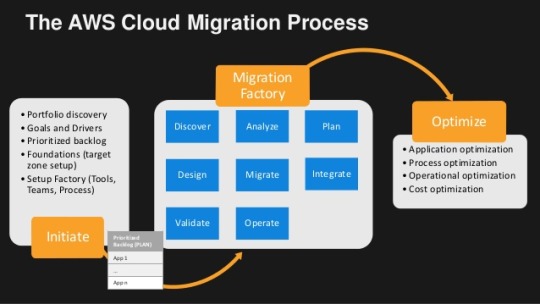
#AWS#AWS Migration Services#AWS Migration Services in India#migration service#lift-and-shift migrations#AWS cloud migration services#advanced cloud migrations#AWS Migration Services in Navi Mumbai#AWS Migration Services near me
0 notes
Text
Journey to Devops
The concept of “DevOps” has been gaining traction in the IT sector for a couple of years. It involves promoting teamwork and interaction, between software developers and IT operations groups to enhance the speed and reliability of software delivery. This strategy has become widely accepted as companies strive to provide software to meet customer needs and maintain an edge, in the industry. In this article we will explore the elements of becoming a DevOps Engineer.
Step 1: Get familiar with the basics of Software Development and IT Operations:
In order to pursue a career as a DevOps Engineer it is crucial to possess a grasp of software development and IT operations. Familiarity with programming languages like Python, Java, Ruby or PHP is essential. Additionally, having knowledge about operating systems, databases and networking is vital.
Step 2: Learn the principles of DevOps:
It is crucial to comprehend and apply the principles of DevOps. Automation, continuous integration, continuous deployment and continuous monitoring are aspects that need to be understood and implemented. It is vital to learn how these principles function and how to carry them out efficiently.
Step 3: Familiarize yourself with the DevOps toolchain:
Git: Git, a distributed version control system is extensively utilized by DevOps teams, for code repository management. It aids in monitoring code alterations facilitating collaboration, among team members and preserving a record of modifications made to the codebase.
Ansible: Ansible is an open source tool used for managing configurations deploying applications and automating tasks. It simplifies infrastructure management. Saves time when performing tasks.
Docker: Docker, on the other hand is a platform for containerization that allows DevOps engineers to bundle applications and dependencies into containers. This ensures consistency and compatibility across environments from development, to production.
Kubernetes: Kubernetes is an open-source container orchestration platform that helps manage and scale containers. It helps automate the deployment, scaling, and management of applications and micro-services.
Jenkins: Jenkins is an open-source automation server that helps automate the process of building, testing, and deploying software. It helps to automate repetitive tasks and improve the speed and efficiency of the software delivery process.
Nagios: Nagios is an open-source monitoring tool that helps us monitor the health and performance of our IT infrastructure. It also helps us to identify and resolve issues in real-time and ensure the high availability and reliability of IT systems as well.
Terraform: Terraform is an infrastructure as code (IAC) tool that helps manage and provision IT infrastructure. It helps us automate the process of provisioning and configuring IT resources and ensures consistency between development and production environments.
Step 4: Gain practical experience:
The best way to gain practical experience is by working on real projects and bootcamps. You can start by contributing to open-source projects or participating in coding challenges and hackathons. You can also attend workshops and online courses to improve your skills.
Step 5: Get certified:
Getting certified in DevOps can help you stand out from the crowd and showcase your expertise to various people. Some of the most popular certifications are:
Certified Kubernetes Administrator (CKA)
AWS Certified DevOps Engineer
Microsoft Certified: Azure DevOps Engineer Expert
AWS Certified Cloud Practitioner
Step 6: Build a strong professional network:
Networking is one of the most important parts of becoming a DevOps Engineer. You can join online communities, attend conferences, join webinars and connect with other professionals in the field. This will help you stay up-to-date with the latest developments and also help you find job opportunities and success.
Conclusion:
You can start your journey towards a successful career in DevOps. The most important thing is to be passionate about your work and continuously learn and improve your skills. With the right skills, experience, and network, you can achieve great success in this field and earn valuable experience.
2 notes
·
View notes
Text
New to cloud migration? Learn the essentials of AWS data migration services needed in 2024 and find the best migration solution for your business.
For more information visit: https://www.augmentedtechlabs.com/blog/how-to-choose-aws-data-migration-service
0 notes
Text
Best Practices for Migrating Legacy EHR Data Assets to AWS Cloud

The process of moving data assets in legacy EHR systems to AWS cloud is a complex and time-intensive task. However, by hiring skilled consultants from a recognized AWS cloud data migration firm, healthcare firms can achieve seamless migration. These experts follow key practices like comprehensive assessment, extraction and transformation, migration execution, and auditing. Read this article to learn more about the migration processes and benefits. Read More: https://medium.com/@elenamia/secure-data-assets-in-legacy-health-record-systems-with-aws-cloud-data-migration-d344b2998a16
0 notes
Text
When re-building your application, Which option do you have that gives optimum performance in Cloud?
#technology#automation#aws cloud#gitlab#aws#google cloud#microsoft azure#startup#cloud migration#cloud services#cloud service provider#cloud security#startups#devops#devopsengineer#devsecops
0 notes
Text
AWS Cloud Migration: Benefits, Strategies, and Phases Simplified

Many businesses embark on their cloud migration journey with a strategy known as “lift and shift.” This approach involves relocating existing applications from on-premises environments to the cloud without altering their architecture. It’s an efficient and straightforward starting point, often appealing due to its simplicity and speed.
However, as companies dive deeper into the cloud ecosystem, they uncover a broader spectrum of possibilities. Lift and shift, though effective initially, is only the foundation of cloud migration. Businesses quickly realize that cloud computing offers far more than just infrastructure relocation.
To unlock its true potential, modernization becomes essential. Modernization transforms applications to align with cloud-native architectures. This ensures businesses can harness advanced features like scalability, resilience, and cost efficiency. It’s no longer about merely shifting workloads; it’s about reimagining them for the future.
This evolution in approach is also reflected in the market’s staggering growth. According to Gartner, Inc., global end-user spending on public cloud services is projected to grow by 20.4% in 2024, reaching $675.4 billion from $561 billion in 2023. Generative AI (GenAI) and application modernization are major drivers of this surge. This data underscores the strategic importance of not just migrating to the cloud but modernizing applications to stay competitive in an evolving landscape.
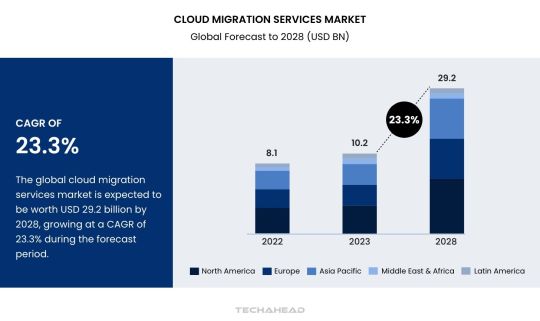
For instance, early adopters of cloud migration often struggled with limited performance gains post-migration. They soon discovered that while lift and shift addressed immediate needs, it didn’t optimize long-term efficiency. Modernization solved this challenge by enabling applications to utilize the dynamic capabilities of cloud platforms.
This shift in approach isn’t just about technology—it’s about competitiveness. Businesses that embrace modernization gain agility and faster time-to-market, giving them a significant edge. They leverage tools like containerization and serverless computing, allowing seamless adaptation to evolving customer demands.
In this blog, we’ll delve into the reasons why lift and shift is just the starting line. We’ll also explore how modernization drives real value and share best practices for ensuring a smooth transition. By the end, you’ll understand why adapting to the evolving cloud landscape is not just a choice—it’s a necessity.
Benefits of AWS Migration
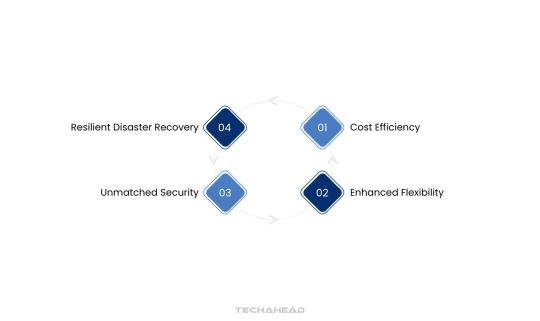
Transitioning your cloud infrastructure to the AWS cloud unlocks unparalleled scalability and efficiency. AWS provides a suite of advanced computing resources tailored to manage IT operations seamlessly. This enables your business to channel its efforts, resources, and investments into core activities that drive growth and profitability.
By adopting AWS cloud infrastructure, you eliminate the constraints of physical data centers and gain unrestricted, anytime-anywhere access to your data. Global giants like Netflix, Facebook and the BBC leverage AWS for its unmatched reliability and innovation. Let’s explore how AWS helps streamline IT operations while ensuring cost-effectiveness and agility.
Cost Efficiency
Expanding cloud infrastructure typically requires significant investment in hardware and administrative overhead. AWS eliminates these costs with a pay-as-you-go model.
Zero Upfront Investment: Run enterprise applications and systems without the need for large initial capital.
Flexible Scaling: AWS enables businesses to upscale or downscale resources instantly, ensuring that you never pay for unused capacity. This dynamic scaling matches your operational demands and avoids the waste associated with overprovisioning.
Advanced Cost Control: AWS provides tools like Cost Explorer and AWS Budgets, helping businesses track, forecast, and optimize cloud expenses. By analyzing consumption patterns, organizations can minimize waste and ensure maximum return on investment (ROI).
Reduced Maintenance Overheads: Without the need to maintain physical servers, businesses save on administrative and repair costs, redirecting budgets to strategic growth areas.
Enhanced Flexibility
AWS offers unparalleled adaptability, making it suitable for businesses of all sizes, whether they are start-ups, enterprises, or global businesses. Its integration capabilities enable smooth migrations and rapid scaling.
Seamless Compatibility: AWS supports a vast number of programming languages, operating systems, and database types. This ensures that existing applications or software frameworks can integrate effortlessly, eliminating time-consuming reconfigurations.
Rapid Provisioning of Resources: Whether migrating applications, launching new services, or preparing for DevOps, AWS provides the agility to provision resources instantly. For instance, during seasonal demand spikes, businesses can quickly allocate additional capacity and scale back during off-peak times.
Developer Productivity: Developers save time as they don’t need to rewrite codebases or adopt new frameworks. This allows them to focus on building innovative applications rather than troubleshooting compatibility issues.
Unmatched Security
Security is a cornerstone of AWS’s offerings, ensuring that your data remains protected against internal and external threats. AWS combines global infrastructure standards with customizable tools to meet unique security needs.
Shared Responsibility Model: AWS takes care of the underlying infrastructure, including physical security and global compliance. Customers are responsible for managing access, configuring permissions, and securing their data.
Data Encryption: AWS allows businesses to encrypt data both at rest and in transit, ensuring end-to-end protection. Businesses can leverage services like AWS Key Management Service (KMS) for robust encryption.
Compliance and Governance: AWS adheres to internationally recognized standards, including ISO 27001, GDPR, and SOC. This helps businesses meet legal and regulatory requirements with ease.
Threat Mitigation: AWS offers tools like AWS Shield and GuardDuty to detect and mitigate cybersecurity threats in real time, providing peace of mind in a rapidly evolving threat landscape.
Resilient Disaster Recovery
Disruption like power outages, data corruption, or natural disasters can cripple traditional IT systems. AWS AWS equips businesses with robust disaster recovery solutions to maintain operational continuity.
Automated Recovery Processes: AWS simplified disaster recovery through services like AWS Elastic Disaster Recovery, which automates recovery workflows and reduces downtime significantly.
Global Redundancy: Data is stored across multiple geographic locations, ensuring that even if one region experiences issues, operations can seamlessly shift to another. This minimizes disruptions and maintains business continuity.
Cost-Efficient Solutions: Unlike traditional disaster recovery setups that duplicate hardware, AWS’s cloud-based approach uses on-demand resources. This reduces capital investments while delivering the same level of protection.
Faster Recovery Times: With AWS, businesses can restore systems and data within minutes, ensuring minimal impact on operations and customer experiences.
Cloud migration with AWS is more than just a technological upgrade; it’s a strategic move that empowers businesses to innovate, scale, and thrive in a competitive market. By leveraging AWS, organizations can reduce costs, enhance flexibility, strengthen security, and ensure resilience.
7 Cloud Migration Strategies for AWS
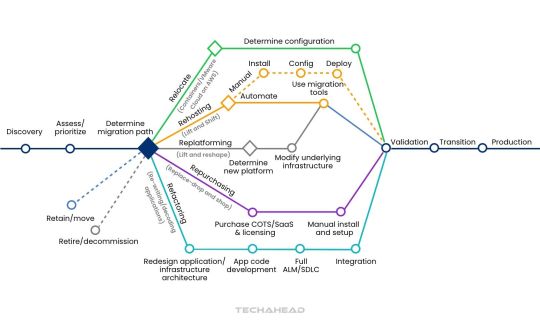
AWS’s updated 7 Rs model for cloud migration builds on Gartner’s original 5 Rs framework. Each strategy caters to unique workloads and business needs, offering a tailored approach for moving to the cloud. Let’s explore these strategies in detail.
Rehost (Lift and Shift)
The rehost strategy involves moving workloads to the cloud with minimal changes using Infrastructure-as-a-Service (IaaS). Enterprises migrate applications and dependencies as they are, retaining the existing configurations. This approach ensures operational consistency and reduces downtime during migration. It is an easy-to-perform option, especially for businesses with limited in-house cloud expertise. Additionally, rehosting helps businesses avoid extensive re-architecting, making it a cost-effective and efficient solution.
Relocate (Hypervision-Level Lift and Shift)
Relocating shifts workloads to a cloud-based platform without altering source code or disrupting ongoing operations. Organizations can transition from on-premises platforms like VMware to cloud services such as Amazon Elastic Kubernetes Service (EKS). This strategy minimizes downtime and ensures seamless business operations during migration. Relocating maintains existing configurations, eliminating the need for staff retraining or new hardware. It also offers predictable migration costs, with clear scalability limits to control expenses.
Replatform (Lift and Reshape)
The replatform approach optimizes workloads by introducing cloud-native features while maintaining the core application architecture. Applications are modernized to leverage automation, scalability, and cloud compliance without rewriting the source code. This strategy enhances resilience and flexibility while preserving legacy functionality. Partial modernization reduces migration costs and time while ensuring minimal disruptions. Teams can manage re-platformed workloads with ease since the fundamental application structure remains intact.
Refactor (Re-architect)
Refactoring involves redesigning workloads from scratch to utilize cloud-native technologies and features fully. This strategy supports advanced capabilities like serverless computing, autoscaling, and enhanced automation.
Refactored workloads are highly scalable and can adapt to changing demands efficiently. Applications are often broken into microservices, improving availability and operational efficiency. Although refactoring requires significant initial investment, it reduces long-term operational costs by optimizing the cloud framework.
Repurchase (Drop and Shop)
Repurchasing replaces existing systems with third-party solutions available on the cloud marketplace. Organizations adopt a Software-as-a-Service (SaaS) model, eliminating the need for infrastructure management. This approach reduces operational efforts and simplifies regulatory compliance, ensuring efficient governance. Repurchasing aligns IT costs with revenue through consumption-based pricing models. It also accelerates migration timelines, enhancing user experience and performance with minimal downtime.
Retire
The retirement strategy focuses on decommissioning applications that no longer hold business value. Inefficient legacy systems are terminated or downsized to free up resources for more critical functions. Retiring outdated workloads reduces operational costs and simplifies IT management. This strategy also allows businesses to streamline their application portfolio, focusing efforts on modernizing essential systems.
Retain (Revisit)
The retain strategy is used for applications that cannot yet be migrated to the cloud. Some workloads rely on systems that need to be transitioned first, making retention a temporary solution. Businesses may also retain applications while waiting for SaaS versions from third-party providers. Retaining workloads provides flexibility, allowing organizations to revisit migration strategies and align them with long-term objectives.
Cloud Transformation Phases

Cloud transformation is a comprehensive process where businesses transition from traditional IT infrastructure to a modern, cloud-centric framework. Below is an in-depth exploration of its critical phases.
Prepare
The preparation phase sets the foundation for a successful migration by assessing feasibility and identity benefits.
Evaluate current IT infrastructure: Audit existing hardware, software, and networks to confirm if the cloud aligns with organizational goals. This step ensures clarity about readiness.
Identify potential risks: Analyze risks like data loss, downtime, or security threats. A detailed mitigation strategy ensures minimized disruptions.
Analyze interdependencies: Understand how applications, databases, and systems interact to prevent issues during migration. Dependency mapping is vital for seamless transitions.
Select a migration strategy: Choose from approaches such as rehosting, refactoring, or rebuilding. Tailor the strategy to meet specific organizational needs and ensure efficiency.
Plan
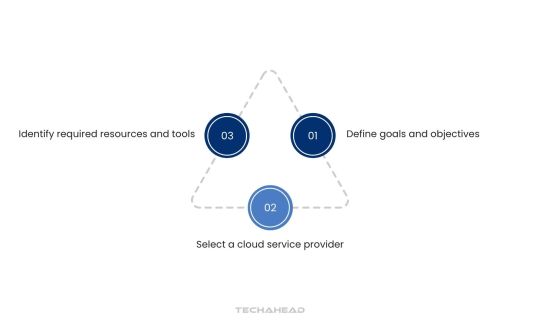
The planning phase involves creating a structured roadmap for the migration process, ensuring alignment with business objectives.
Define goals and objectives: Establish specific goals like cost reduction, scalability improvement, or enhanced security. This clarity drives project focus.
Select a cloud service provider: Choose a provider that matches your organization’s priorities. Evaluate cost, performance, security, and customer support before finalizing.
Identify required resources and tools: Determine essential resources such as migration tools, management software development, and skilled personnel to execute the project effectively.
Migrate
Migration focuses on the actual transfer of IT infrastructure, applications, and data to the cloud.
Configure and deploy cloud resources: Set up virtual machines, storage, and networking components to create a robust cloud environment for workloads.
Migrate data securely: Use data migration tools or replication techniques to ensure secure and accurate data transfer with minimal disruptions.
Test applications in the cloud: Run performance tests to verify that applications meet operational requirements. Address issues before full-scale deployment.
Operate
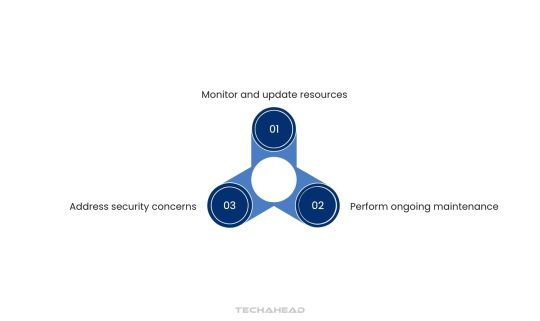
The operation phase emphasizes managing and maintaining the cloud environment for optimal performance.
Monitor and update resources: Continuously monitor cloud infrastructure to identify bottlenecks and ensure resources align with evolving organizational needs.
Perform ongoing maintenance: Proactively resolve infrastructure or application issues to prevent service interruptions and maintain system integrity.
Address security concerns: Implement robust security measures, including encryption, access controls, and regular log reviews, to safeguard data and applications.
Optimize
Optimization ensures that cloud resources are fine-tuned for maximum performance and cost efficiency.
Monitor performance metrics: Use advanced monitoring tools to track application performance and identify improvement opportunities in real time.
Adjust and fine-tune resources: Scale resources dynamically based on demand to maintain performance without unnecessary cost overheads.
Leverage cost-saving features: Use provider offerings like auto-scaling, reserved instances, and spot instances to minimize operational costs while maintaining quality.
By thoroughly understanding and executing each phase of cloud transformation, organizations can achieve a seamless transition to a modern, efficient cloud environment. This structured approach ensures scalability, performance, and long-term success.
Conclusion
Cloud migration is a multifaceted process that demands in-depth analysis of existing challenges and aligning them with strategic changes to meet business objectives. Selecting the right migration strategy depends on workload complexities, associated costs, and potential disruption to current systems. Each organization must evaluate these factors to ensure a smooth transition while minimizing impact.
While the benefits of a well-planned migration are significant, organizations must address the ongoing risks and effort required for maintenance. Ensuring compatibility and performance in the cloud environment demands continuous oversight and optimization.
For a deeper understanding of how TechAhead can streamline your cloud migration journey, explore our comprehensive guide on migrating enterprise workloads. Our cloud migration case studies also provide insights into the transformative advantages of moving critical business operations to the cloud. Partnering with experts ensures a seamless transition, unlocking agility, scalability, and innovation for your business.
Source URL: https://www.techaheadcorp.com/blog/aws-cloud-migration-benefits-strategies-and-phases-simplified/
#AWS Cloud Services#Cloud Transformation#AWS Cloud Migration#Lift and Shift Cloud Migration#Cloud Migration Strategies
0 notes
Text
SAP on Cloud: Unleashing the Power of Scalability, Flexibility, and Cost-Efficiency
Cloud computing has revolutionized the way businesses operate, allowing them to access a range of IT resources and services without the need for on-premises infrastructure. One of the most promising applications of cloud computing is the deployment of enterprise resource planning (ERP) systems on cloud platforms. SAP, the market leader in ERP systems, has been at the forefront of this trend by offering SAP on cloud solutions to its customers. In this article, we will explore the benefits of deploying SAP on cloud and the role of cloud service providers in enabling this transformation.
What is SAP on Cloud?
SAP on cloud refers to the deployment of SAP applications on cloud platforms, such as Amazon Web Services (AWS), Microsoft Azure, or Google Cloud Platform. This model allows businesses to access SAP applications over the internet, without having to invest in their own hardware or software infrastructure. SAP on cloud provides the same functionality and features as on-premises deployments but with the added benefits of scalability, flexibility, and cost-efficiency.
Benefits of SAP on Cloud
There are several benefits of deploying SAP on cloud, including:
Scalability: Cloud platforms provide businesses with the ability to scale their SAP applications up or down based on their changing needs. This means that businesses can easily add new users, modules, or features without having to invest in new hardware or software infrastructure.
Flexibility: Cloud platforms offer businesses the flexibility to choose the deployment model that best suits their needs, whether it be public, private, or hybrid cloud. This means that businesses can deploy SAP on cloud solutions that meet their specific requirements and compliance needs.
Cost-efficiency: Deploying SAP on cloud can be more cost-efficient than traditional on-premises deployments. This is because businesses only pay for the resources and services that they use, without having to invest in hardware, software licenses, or maintenance.
Disaster Recovery: Cloud platforms provide businesses with disaster recovery capabilities that are not feasible with on-premises deployments. This means that businesses can quickly recover from unexpected downtime or data loss events.
Role of Cloud Service Providers
Cloud service providers play a critical role in enabling the deployment of SAP on cloud solutions. They provide the necessary infrastructure, security, and management services that businesses need to deploy SAP applications on cloud platforms. Cloud service providers also offer a range of tools and services that help businesses optimize their SAP on cloud deployments, including automation, monitoring, and analytics.
There are several cloud service providers that offer SAP on cloud solutions, including AWS, Azure, and Google Cloud Platform. Each provider offers unique features and capabilities that businesses can leverage to optimize their SAP deployments.
Conclusion
SAP on cloud is the future of business, offering businesses the scalability, flexibility, and cost-efficiency they need to compete in today’s fast-paced business environment. Cloud service providers play a critical role in enabling this transformation, providing businesses with the necessary infrastructure, security, and management services to deploy SAP applications on cloud platforms. As more businesses adopt SAP on cloud solutions, the role of cloud service providers will become increasingly important in enabling this transformation.
#sap services#cloud computing#cloud services#cloud service providers#cloud migration#aws cloud migration services
1 note
·
View note